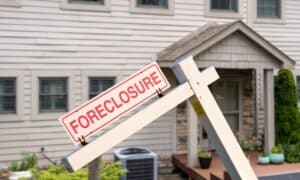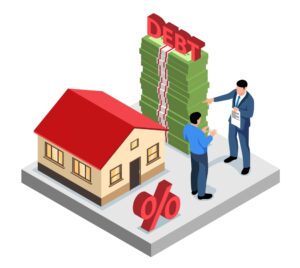Financial difficulties can occur at any time and because of a variety of reasons.

These may include loss of employment, sudden illness, or any other set of unlucky financial scenarios. And the situation becomes much more complicated if you need to repay the mortgage on your house and the repayment period is drawing to a close.
In such instances, the possibility of foreclosure becomes quite high, and it can often be challenging to find effective solutions to deal with it.
Well good news! You can stop a Nevada foreclosure in a couple of ways, and down to the last minute.
We’re about to share some of the best solutions to prevent your Nevada house from being auctioned off. And yes, these can be used down to the last days and last minutes of the process.
Read on! We’ve got you covered.
What Is Foreclosure Nevada?
When it comes to buying a house, most people do not have the necessary funds to be able to do so. That is why they need to take out a mortgage for the purpose for which the house serves as collateral.

The mortgage needs to be repaid in monthly installments, but this may not be possible in certain situations, such as when an illness prevents the borrower from working.
In such a scenario, the lender can legally take possession of the house and sell it to recoup their losses. The legal process through which the lender acquires the property is called foreclosure and involves the Nevada homeowner being evicted from the house.
Foreclosure is mentioned on the credit report and affects your credit rating for seven years.
How Is A Mortgage Foreclosure Different From A Tax Lien Foreclosure Nevada?
It can be easy to get confused between a mortgage foreclosure and a tax lien foreclosure. In the case of a mortgage foreclosure, the lender has the right to put up your house for auction to recover their losses if the mortgage is not repaid. This process generally requires around six months, calculated from when the first payment is missed to when the auction is held.
In contrast, a tax lien foreclosure is initiated by the local Nevada government when property taxes are not paid on time. When this happens in a tax deed state, the house is auctioned in a manner similar to a mortgage foreclosure. But in the case of a tax lien certificate state, the lien is auctioned off against the home, and the purchaser has to collect on the lien.
The house can then be put up for auction, and a tax lien foreclosure can take years to complete.
The Nevada Mortgage Foreclosure Process
The mortgage foreclosure process in Nevada can vary, with some counties following a judicial foreclosure process and others following a non-judicial one. In the former case, the foreclosure proceedings require the approval of the court, and the borrower enjoys greater protection. It also takes much longer to complete compared to a non-judicial process where the courts are not involved.

However, the usual period for the entire process to complete is roughly the same. They start with the lender contacting you after the mortgage payments have not been made for over a month. After 45 days, the lender will send a written notice to discuss available options.
If the payments are still not made by the end of 60 days, a grace period of 30 days is provided to consult a housing counselor. And once 90 days have passed, the lender will notify you that they intend to foreclose.
After 120 days, the lender sends an official foreclosure notice, and they may file an application in court, depending on the requirements. As per the Dodd-Frank Act, lenders must wait at least 120 days after payment default before initiating foreclosure proceedings.
In Nevada, the lender can advertise the foreclosure auction, and you may be contacted by real estate investors, bankruptcy attorneys, etc., offering their services. At the auction, the bidding for the property is usually started at the amount the lender is owed, which includes marketing and legal fees and back payments.
And since foreclosure auctions are not generally held at your home, the condition of the house is not known, which is why people usually refrain from bidding. The lender has to take possession of the property, which can take a few months, and they may need to file for eviction if you still reside there.
Stopping Nevada Foreclosure Proceedings
Generally, it is possible to stop a Nevada foreclosure process before the auction takes place. However, the closer it gets to the auction, the harder it becomes to stop it. That is why it is vital to make mortgage payments a priority so that such a situation does not arise.

Stopping a Nevada foreclosure sale early on is easier as prospective buyers require time to inspect the property, conduct a title search, arrange for financing, and schedule the closing. All this can take up to 60 days to complete, while expedited settlements where investors are involved can take a few weeks.
So, if you can repay the due amount before the auction, in most cases, the mortgage lender will stop the Nevada foreclosure sale.
Ways To Stop Foreclosure At The Last Minute Nevada
If you’ve defaulted on mortgage payments for three months, the methods that can be used to stop foreclosure in Nevada will depend on your financial condition. They will also be affected by how much of the foreclosure process has been completed by the lender.
1. Reach A Settlement With The Lender
Sometimes, you may be unable to repay the mortgage for a short period due to some difficulty, but you can now continue with the payments. In such instances, the best option is to reach an agreement with the lender regarding the payments, especially if paying back the missed payments in one installment is not possible.
The mortgage company or lender may devise a repayment plan that may involve adding parts of the missed payments to future payments to help you get back on track. Or there may be other mortgage relief options available that might meet your needs more effectively.
2. Request A Mortgage Forbearance
Requesting a mortgage forbearance is another option you can use when facing foreclosure in Nevada. It allows putting the monthly mortgage payments on hold for a specified period. The mortgage lender can allow you this time to recover financially so that the deferred payments can be completed later on.
Depending on the lender, the payments may be postponed to the end of the mortgage period or may need to be repaid under a loan modification or repayment plan. However, it is important to understand that the amount due during the forbearance period will have to be paid in full when that period ends.
3. Apply For A Loan Modification
Ideally, you should seek a loan modification when the lender has not yet started the foreclosure process, but it can also be used to stop foreclosure in Nevada after it has been initiated. Loan modifications work similarly to refinancing a loan and make it more affordable for the borrower.
They prevent lenders from dual tracking, which is the process of continuing with foreclosure while considering a loss mitigation application from the borrower. The mortgage may be modified by reducing the interest or waiving a part of the principal. It is even possible to avoid penalties for non-payment and late fees under a loan modification.
Generally, the most common type of loan modification involves extending the repayment term providing more time for repayment. If the lender agrees to the loan modification, the Nevada foreclosure process stops, but you need to meet the terms of the modified loan till it is completely repaid.
4. File For Bankruptcy
While it is an extreme step that should only be used as a last resort, filing for bankruptcy in a bankruptcy court is an effective way of stopping foreclosure. With a bankruptcy filing, all the creditors, including the lender, immediately have to stop their recovery efforts.

This is known as an automatic stay under bankruptcy laws and can only be overturned if the court accepts the lender’s motion to allow the proceedings to continue. Even then, an automatic stay can provide a few months, during which you can make arrangements for repaying the loan. It may even be possible to decide on a repayment plan with the creditors.
When filing for bankruptcy, it is vital to consider the available options, as there are two forms of bankruptcy that can be used. Under Chapter 13 bankruptcy, debts are restructured and allow negotiating a payment plan so they can be paid off in three to five years. This is the best option if you want to retain your home.
Another option is to file for bankruptcy under Chapter 7. Under this, debts are liquidated, and this is the preferred option if you’ve accepted that there is no way to save the house. This option provides time to save money and look for a new residence.
5. File A Lawsuit
In counties where non-judicial foreclosures are allowed, lenders can initiate foreclosure without notifying the courts. This is usually possible because the mortgage agreement contains a clause giving them the power to foreclose without court intervention. In such cases, you can stop or delay the Nevada foreclosure by filing a lawsuit against the lender.
However, the lawsuit will have to prove that the lender did not hold a promissory note on the loan and was in non-compliance with state mediation laws. Alternatively, you should be able to prove that the lender is in violation of state law or does not have the necessary documents relating to the mortgage.
Similarly, if it can be proven that the lender has made a serious error of any other nature, foreclosure of the property can be stopped. Keep in mind that this is an extreme measure, and if you are unable to prove your claims, foreclosure will not be stopped. In addition, the court may find the case frivolous, in which case, the lender will need to be compensated for the attorney fees and court expenses.
Filing a lawsuit can be expensive, so it is best to consult a Nevada foreclosure attorney before doing so. This strategy will not be effective in counties with judicial foreclosure as the courts review all foreclosure-related cases.
6. Hold A Short Sale
Sometimes, you may not be eligible for repayment plans and other options that allow you to retain the house. In such situations, one option is to hold a short sale where the house will be sold for an amount lesser than what is owed to the lender. The sale proceeds are paid to the lender, who may decide to waive part or all of the loan.
Since the lender will be getting less than the due amount, you will need to get their approval before holding a short sale. This method can help the lender avoid the hassle of foreclosure and will leave your credit report unaffected.
7. Deed In Lieu Of Foreclosure Nevada
Just like a Nevada short sale, a deed in lieu of foreclosure is an option where it is not possible to retain the ownership of the house. In this case, you transfer the property title and ownership to the lender and become free of the mortgage obligations. While this will affect your credit rating, its impact will be less severe than that of foreclosure.
Because of this, it may be possible to get approval for financing when you’re ready to buy a new home more quickly.
8. Sell Off The Nevada Property
Besides holding a short sale, you can consider selling off the property through a regular sale, but this should be done quickly as the mortgage interest is continuously building up. It is highly likely that there will be many real estate investors and other people interested in buying the house, so expect several offers.

Usually, it can take seven to ten days for such a sale to complete, and the proceeds can be used to repay the remaining balance and any other outstanding debts. Selling the house quickly can help avoid a Nevada foreclosure and prevent your credit from being affected. To speed up the selling process, search for cash buyers who do not require a mortgage and can buy the place in its current condition (as-is).
Doing so will help you avoid expenses on repairs and make it easier to get the funds needed for making payments. A real estate agent can be very helpful in such situations and assist in staging and showing the house to prospective buyers. Or you can simply request a cash offer from a professional real estate investor and avoid the showings, staging, fees, and hassle.
Preventing Foreclosure Nevada
The above methods can help you stop Nevada foreclosure after the proceedings have been initiated by the lender. However, it is always better, both for you and the mortgage company, to take measures to prevent such a situation from arising in the first place.

Since it may not always be possible to have the funds required to continue making the mortgage payments, having some emergency liquid funds or a savings account is vital. This can be managed by saving up some amount over a few months for contingencies. Alternatively, you can use some assets, such as jewelry, to repay the mortgage.
You can also consider refinancing the mortgage to prevent foreclosure, which may help reduce the amount needed to be paid monthly. This can be very useful in the case of an adjustable-rate mortgage (ARM) if the income gets reduced for any reason, or if household expenses increase.
Whatever the case, staying in contact with the lender can be beneficial in the long run if you expect to run into problems regarding repayment in the future. Lenders also prefer a solution that helps them get their dues rather than going through the tedious process of foreclosure.
Recovering Your Property After Foreclosure Nevada
Homeowners in Nevada have a right of redemption, which provides them with a chance to recover their house within a specified period. This usually requires paying the person who bought the property at the foreclosure auction the full purchase price along with other costs.
The regulations that govern this can vary between different states, so you need to take a look at them to determine the conditions to be met for recovery. If you can meet those requirements, it might be possible to get the house back after foreclosure.
Final Thoughts
Many people have difficulty dealing with the prospect of foreclosure and the possibiity of losing their Nevada home. When facing such a situation, it is crucial to understand that there are ways to stop the Nevada foreclosure process.

Depending on your circumstances, you can decide which option from the ones mentioned above best meets your needs. Taking the help of a Nevada foreclosure defense attorney can make things a lot simpler as they have considerable experience and can provide the necessary guidance.
Or to sell your house before foreclosure, simply get in touch with us at Priority Home Buyers. We work around the clock in Nevada to stop foreclosures fast with fair, last minute cash offers on homes. Call us anytime at 877-775-0988 day or night for a free consultation by phone with one of our foreclosure experts.
We’re determined to help, and here to guide you out of a sticky situation to a new beginning!
Nevada Seller Resources




